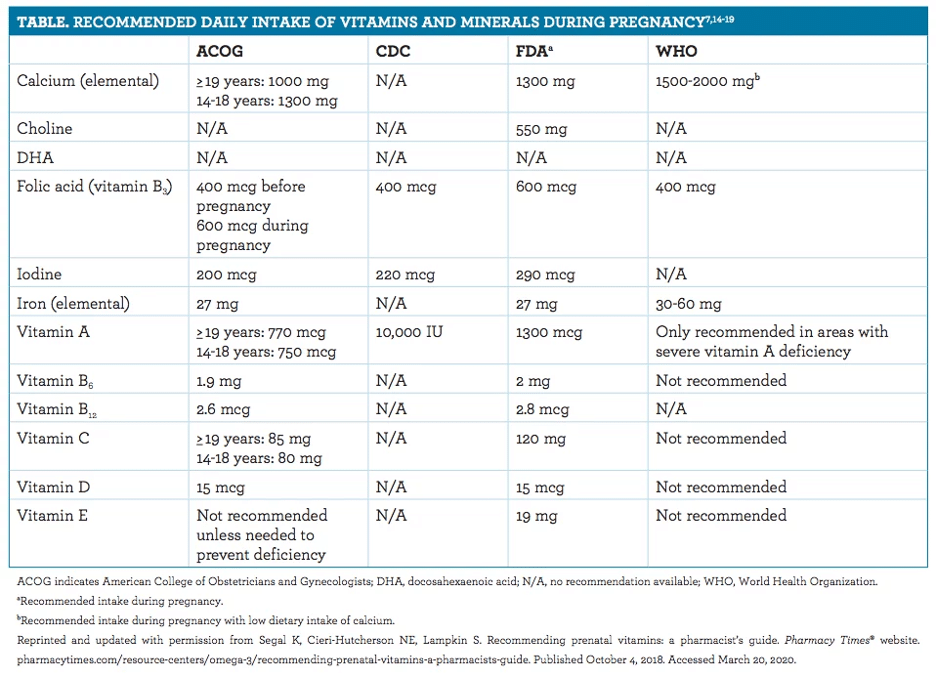
Herbal Medications & Supplements: Are They Right For You During Pregnancy?
When you are pregnant, trying to conceive, or breastfeeding, you want to do everything possible to optimize your health. You’re probably aware of the importance of taking a daily prenatal vitamin to decrease your baby’s risk of birth defects. But you may be wondering…are there other vitamins or supplements I should be taking? Are there herbal medicines that can support my overall health and wellbeing during this important time?
What Does the Research Say?
It’s tough to get reliable or evidence-based information about supplements and herbal medications prior to conception, during pregnancy, or while breastfeeding. Unfortunately, we often don’t have much research about most dietary supplements and herbal medications in general. There’s even less research about their effects prior to conception, during pregnancy, and during lactation.
The research we do have is always changing and evolving. Sometimes we think something is safe, then new research comes out advising caution. Or, there may be additional research which determines that something is safer and more beneficial than originally thought. This is why it’s important that you talk with your CNM (Certified Nurse Midwife) or OB-GYN who knows you, your pregnancy, and how to evaluate the scientific literature.
For more information, try this article “Using Dietary Supplements Wisely,” on the National Center for Complementary and Integrative Health’s website or the USDA’s website on Dietary Supplements.
What Does the FDA Say?
In the United States, the Food and Drug Administration (FDA) within the Department of Health and Human Services, provides oversight of prescription and over the counter medications. They’re responsible for making sure that drugs are appropriately researched, that they’re properly labeled and that their contents meet federal requirements. In contrast, supplements and herbal medications are not regulated by the FDA so their claims and safety cannot be verified in the same way. They could contain a higher/lower dose or even other ingredients than those which are listed on the container. The FDA’s website has more information on dietary supplements, if you’d like to learn more.
Prenatal Vitamins
Ideally you want to eat a nourishing, high-quality diet rich in phytonutrients, vitamins and minerals at all times, but especially during pregnancy. This allows you to get the calories and nutrients that your developing baby needs to grow, and that you need to be healthy during this time. Even with a high-quality diet, there may be times when you fall short of recommended amounts of vitamins and minerals. Because of this, it’s recommended that women who are trying to conceive and pregnant women take a single pregnancy multivitamin with 400 micrograms (mcg) of folic acid every day. You should start taking a prenatal vitamin at least 3 months prior to conceiving and continue it for at least the first 12 weeks of pregnancy. If you start taking a prenatal vitamin prior to conception, it may decrease the amount of nausea and vomiting that you experience when pregnant. For more information on choosing a prenatal vitamin, visit the Mayo Clinic’s website.
Folic Acid
Folic acid is especially important prior to conception and through at least the first trimester. Deficiencies in folic acid can lead to an increased risk of neural tube defects in your baby. Some women with a higher risk of having a baby with a neural tube defect will likely be encouraged to take additional folic acid. But remember, just as not taking a prenatal vitamin containing folic acid can cause an increased risk of birth defects, so can taking more than one. So be sure to follow the recommended dose.
Tough to Take?
If you are having trouble tolerating swallowing a prenatal vitamin each day, let your health care practitioner know so that they can help you find a different way to get this vitamin, such as a chewable or liquid form.
If your CNM or physician has not recommended a specific brand or requirement for your prenatal vitamin, most pharmacies contain several over-the-counter prenatal vitamins which are beneficial. Look for one that contains folic acid, iron, calcium, and vitamin D. A prenatal vitamin should also have vitamins A, C, E, B, zinc and iodine.
If you become constipated while taking your prenatal vitamin, consider increasing your fiber and water intake. You can also check with your CNM/MD about the possibility of using an over the counter stool softener.
If you follow a vegan or vegetarian diet, you may need to make sure you are getting all the right nutrients to support a healthy pregnancy. Talk to your CNM/MD or registered dietitian about additional vitamins you may need such as B12.
Top 5 Tips around Vitamins, Supplements, and Herbal Medications During Pregnancy
- Healthcare Practitioner: Talk to your CNM or physician about all of the supplements, herbal medications and vitamins that you have taken, are taking, or want to take.
- Medication Management: Bring all of your medications (prescription and over the counter), supplements, vitamins, and herbal medications with you (in their original containers) to your prenatal visit so that you can ensure that your medical record is up to date.
- Over the Counter Medications: Keep a convenient list of the over the counter medications (and possibly prescription medications) that your CNM or OB/MD has said are safe for you to take when you experience certain symptoms during pregnancy or while breastfeeding. WebMD has more information about over the counter medication use during pregnancy on their website.
- Vitamins, Minerals, & Supplements: Take one (and only one) prenatal vitamin with 400 micrograms of folic acid each day during pregnancy. Also, talk to your CNM or OB/MD to see if you should take any additional vitamins, minerals or supplements during pregnancy. They may mention some, such as DHA (a type of omega 3 fatty acid that supports fetal growth and development that is in some but not all prenatal vitamins and can be found in seafood), vitamin D, iron, calcium, iodine, choline, magnesium, and/or additional folic acid.
- Take as Directed: Take your prenatal vitamin and medication(s), as directed by your CNM or OB/MD. Also, only take the medications that are prescribed for you specifically. If your CNM or OB/MD recommends that you take an herbal medication, supplement, or vitamin during pregnancy, only take it as prescribed (taking a higher dose or more often can be dangerous).
Talk to Your Certified Nurse Midwife or Doctor
Your Certified Nurse Midwife, OBGYN, or physician caring for you prior to conception, during your pregnancy or while breastfeeding, knows about your medical conditions, your pregnancy, and any special precautions that are needed for you and your baby’s safety. Because of this, you should talk with your certified nurse midwife (CNM) or doctor prior to taking any supplements or herbal medications. They will let you know whether or not it is safe to take them, or if you should avoid them during this time. The American College of Obstetricians and Gynecologists has a website with information about Nutrition in Pregnancy with more on vitamins and minerals during pregnancy. They also have a website on Good Health Before Pregnancy that has info about herbal medications and supplements if you want to learn more.
If you don’t already have a women’s health focused healthcare practitioner, book a visit with us at Diana Health so that we can help you establish care with one of our Certified Nurse Midwives or OB-GYNs in your area. We specialize in helping women optimize their health (and the health of their baby) prior to pregnancy, throughout pregnancy, and for years to come. If we don’t have a location near you, reach out to a Certified Nurse Midwife or OB-GYN in your area so that they can support you on this journey.

Share This Post
























